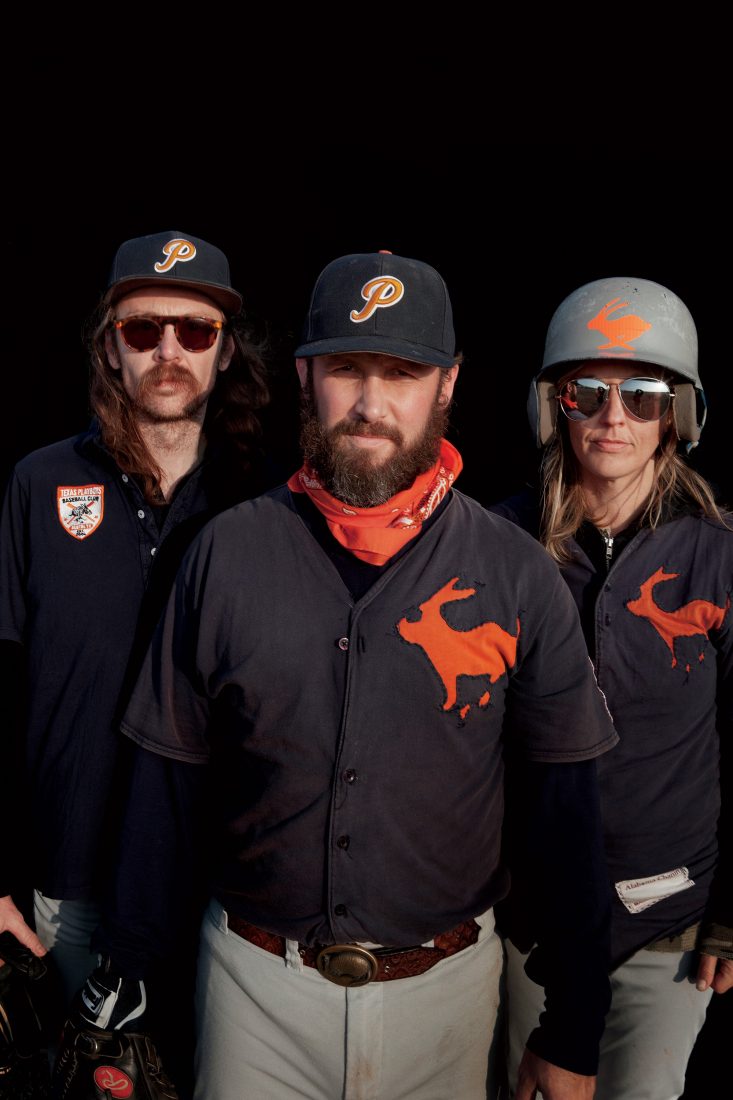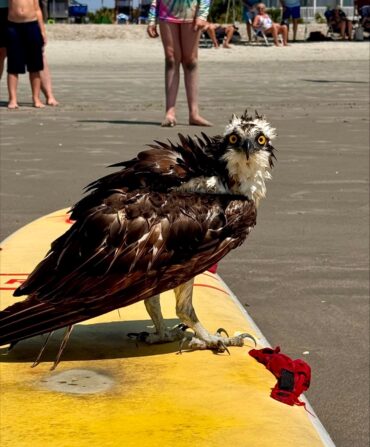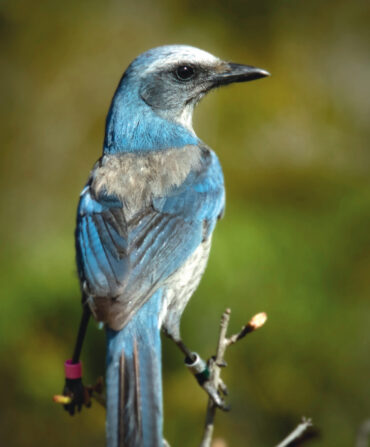Jack Sanders makes for an odd-looking baseball player. He’s six feet tall, with a big brown lumberjack beard that would look a bit overstated on an ice climber. On the diamond, where he alternates between the mound and first base for the Texas Playboys, he wears a felt Stetson Open Road hat. When Sanders steps up to the plate, he sometimes adjusts an armadillo belt buckle he describes as “modest sized,” which in Texas—Sanders grew up in Cleburne and now lives in Austin—means slightly smaller than a hubcap.
And yet among Sanders’s fellow players, his game-day apparel is comparatively low-key. It’s not unusual to see his teammates on the Playboys wearing cowboy boots at home plate. Players on the rival Los Yonke Gallos de Marfa once showed up for a game wearing prison uniforms they’d borrowed from the local sheriff. Legend has it that when the Newbern Tigers from Hale County, Alabama, were short a player, they gave a bat to a woman from the stands who’d come straight from church. She got on base in her Sunday best.

Photo: Brent Humphreys
Play Ball!
The Playboys at bat against Los Jardineros de Austin.
This is the ethos of American sandlot baseball, a community-based, slightly makeshift sporting tradition that Sanders has been helping to revive across the South. At least in its contemporary form, sandlot baseball—as distinct from other adult baseball and softball leagues—is what Sanders calls “the slow food of sports.” It’s played not at well-lit sports complexes, with their public address systems, concession stands, and ample parking, but off the grid, on private property or unclaimed lots, with few amenities and often no bleachers. The game has an old-world feel: Teams make their own uniforms and stick to wooden bats. Whereas conventional adult amateur ball orients itself toward the fantasy of the big leagues, sandlot baseball is concerned with the party behind the backstop—where there’s usually music, barbecue, and a steady supply of suds. Above all, sandlot ball is not earnest or particularly competitive, but loose and easy. Sanders recalls a favorite pitcher from his early years in sandlot who would walk to the mound with a cigarette in his mouth, crush it beneath his cleats before his first pitch of the inning, and chatter from that spot the whole game long, as if idling at a bar with his pals.
“It’s less about baseball than what’s happening on the other side of the fence—deejays and chefs and whole pigs,” Sanders says. “This is more about pastime.”

Photo: Brent Humphreys
Getting encouragement from a fan.
As the founder of the Austin-based Playboys, Sanders has become one of the nation’s leading proselytizers for sandlot baseball and has had a hand in inspiring the creation of a kind of informal league around the South and Southwest. The teams have names like the Houston Sugar, the New Orleans Po Boys, and the Alabama Slammers, a Florence-based club started by clothing designer Billy Reid.
For Reid nostalgia is as much of a draw as the physical act of playing ball. “You get to relive the spirit of childhood,” he says. “You feel like a fifteen- or sixteen-year-old.”
Games are sometimes scheduled off the cuff, or months in advance, when one team announces a challenge to another team far away, matchups that are typically sandwiched between dinners and nights of drinking. Sandlot rosters are composed of working people, assorted creative types, and occasional ne’er-do-wells who may or may not possess a basic understanding of the game. Once a player makes the roster of a sandlot team, participation is encouraged but by no means required.
“I have a roster of thirty-six just so I can field nine,” Sanders says.
Sanders’s introduction to sandlot ball came in the spring of 1998, during his second year as an architecture student at Auburn University. Looking for an experience to broaden his worldview, he enrolled in the school’s famed Rural Studio, a sustainability-oriented design-and-build program located away from campus in Hale County, deep in Alabama’s Black Belt.
At a Hale County Piggly Wiggly one afternoon, a local named Tiny invited Sanders to go see the Newbern Tigers, a black sandlot team that had been playing in the area on and off for a century. Sanders hopped in his car and followed Tiny down a red dirt road, past a grove of cedars and oaks, to a clearing, where he saw a crowd of four or five hundred listening to music, eating freshly fried catfish and barbecued whole pig, and washing it all down with a robust supply of cold canned beer. At the center of the action was a baseball diamond set off by a sagging chicken-wire backstop and sections of chain-link fence. “It was only what it had to be, and nothing more than that,” Sanders says.
On weekends when fellow Rural Studio students went back to campus for football games, he stayed in Hale County for games and became the rare white regular in the crowd. For his architecture thesis, he designed and built a new backstop behind home plate, made of steel pipe and chain-link. Sanders knew the rosters for the Tigers and their opponents were fluid—players didn’t always show up—so he started keeping a baseball glove in his car, just in case. Sure enough, one afternoon the Melton Clowns showed up with only eight players. Sanders got called up, hit two doubles against his favorite team, and made a diving catch for a crucial out. By the end of the day, he had an offer to join the Tigers as a regular.
More than the baseball, he says, he was affected by the role the Tigers played in creating a sense of community in an impoverished region. They were entertainment, a social club, and a service organization that would raise money for churches and hand-dig graves to help families cut down on funeral costs.

Photo: Brent Humphreys
A team huddle.
Eventually, Sanders left Hale County, headed back to Texas to get his graduate degree in Austin, and went on to open his own design shop. He was working on a tree house for the filmmaker Richard Linklater when the Newbern Tigers came up. Linklater suggested that Austin could use an organization like the Tigers, and that’s when it hit Sanders: He’d start one, and their first game would be on the road against the Tigers themselves. In 2007, Sanders and his newly formed Texas Playboys left for Hale County. Four hundred people showed up for game two of the doubleheader.
“They destroyed us,” Sanders says.
The Playboys were unbowed. They went back for a rematch the following year, and Sanders began challenging friends in other cities around the South to games. A pattern emerged: Those friends would put together a sandlot team to square off against the Playboys, but after the Playboys left, the new team would remain intact. In effect, the process has created a collective—organization is too strong a word in the context of sandlot—of teams that play the game in the spirit of the Newbern Tigers.
This season the Playboys kick off with a matchup at home against the Alabama Slammers, and plan to take at least one long road trip in an effort to colonize some new town with a sandlot team. “All it takes is getting nine people together for one game to start this thing,” Sanders says. “It can happen anywhere. You don’t complain if there is a tree in the middle of center field. You just play.”








